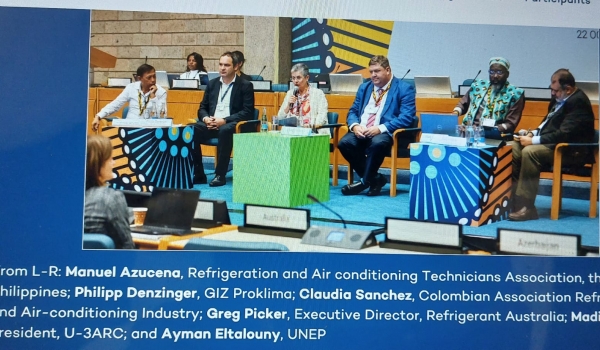MOP35 - Intervention President U-3ARC, Madi Sakandé, in Nairobi
Workshop prior to the 35th Meeting of the Parties to the Montreal Protocol on Substances that Deplete the Ozone Layer (MOP35), on October 22, 20232 in Nairobi, Kenya, Madi Sakandé, President of U-3ARC, returned, during its intervention, on the effective needs to be applied at the level of 3 entire sectors of the Refrigeration and Air Conditioning (RAC) profession, namely engineering & production, installation & maintenance and end user, to achieve this.
Daouda MBaye, Journalist

Everywhere across the planet, the effects of climate change are being felt. Fortunately, over the past decade, refrigeration, air conditioning and heat pump (RACHP) technologies have grown significantly. This is where the Montreal Protocol on Substances that Deplete the Ozone Layer fits in with its counterpart, the United Nations Framework Convention on Climate Change. The Montreal Protocol is widely considered the most successful multilateral environmental agreement in force today. The Kigali Amendment, which aims to reduce the production and consumption of hydrofluorocarbons (HFCs), complements it to help reduce global warming.
A set of measures
At the pre-meeting workshop on energy efficiency to share best practices and assess how best to operationalize energy-saving technologies, which have clear co-benefits for climate change mitigation, as requested by the Secretariat to the delegates to the 34th Meeting of the Parties (MOP 34) to the Montreal Protocol, there were fruitful exchanges, led by renowned experts and professionals, during the conferences, exhibitions in various stands, videos and posters outside the rooms.
At the start of the Workshop, Sunday October 22, 2023, Megumi Seki, Executive Secretary of the Ozone Secretariat, highlighted the importance of energy-saving technologies in the implementation of the Kigali Amendment. Note that the delegates present met over the course of 5 sessions, participating in round tables on a variety of topics.
For Madi Sakandé, President U-3ARC, interventions on 3 levels, differentiated proportions relate to engineering & production (20%), installation & maintenance (30%) and end user (50%). In his opinion, it is necessary to adopt regulatory texts to take into account energy efficiency in refrigeration and air conditioning during the design, construction and operation phases of buildings and structures. because the cold chain must be developed in Africa.
To achieve this, President U-3ARC believes that it is necessary to involve professional organizations and associations in the RAC sector in the development and implementation of policies and strategies and in activities related to refrigeration and air conditioning.
To avoid security problems, it finds it necessary to support and develop professional training centers, while ensuring their proper functioning, their equipment with appropriate educational materials and facilitating accessibility. This would involve the provision of scholarships.
Among other measures, the president of the Pan-African union of associations in the refrigeration sector recommends initiating a reflection on the zero-rating and/or exemption of refrigeration materials and equipment, to the extent that air conditioning is not a luxury but a necessity to ensure the socio-economic development of the country; establish a legal framework for better consideration of cold in public development policies and organize the sector at the national/continental level; promote women in the refrigeration and air conditioning professions; adopt texts of African anti-dumping regulations… He did not forget to draw attention to developing a public administration benchmark for projects for the acquisition of refrigeration equipment and for maintenance operations on this equipment , on the need to support the activities promoted by national associations in the refrigeration sector or even restructuring at the African level and the collaboration of national associations, with the respective environment and climate directorates.
